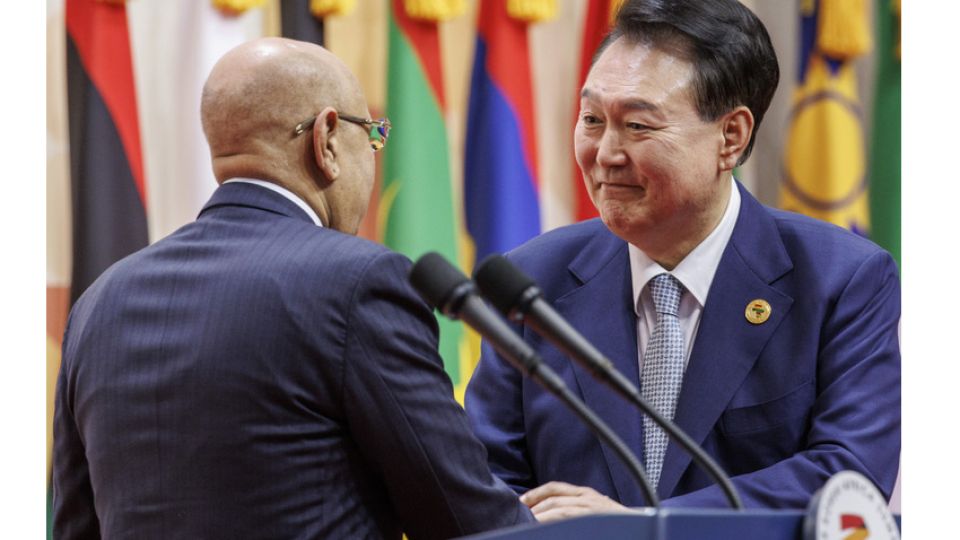June 5, 2024
SEOUL – The leaders of South Korea and African countries agreed to launch a multilateral dialogue for critical minerals to ensure their stable supply and promote technology cooperation at a summit held in Seoul to redefine diplomatic and economic ties between Asia’s fourth-largest economy and the continent on Tuesday.
At the first-ever summit hosted by the Korean government with African countries to strengthen mutual trust and solidarity, Seoul vowed to provide up to $10 billion in development aid to Africa over the next six years to 2030. South Korea is estimated to have extended over $3 billion of humanitarian aid across the world in 2023. The Seoul government also pledged to support local companies’ entry to Africa through a cumulative $14 billion in export finance through 2030.
“The launch of the Korea-Africa Critical Minerals Dialogue will be the world’s exemplary case of sustainable development by seeking mutually beneficial cooperation and stability in the industrial supply chain,” President Yoon Suk Yeol said at a press conference at the summit venue.
The launch of the dialogue comes as a minerals supply crunch has highlighted the need for South Korea — a powerhouse for electric vehicles and secondary batteries that is home to Hyundai Motor, Kia and LG Energy Solution, among others — to secure industry resilience. Such needs of South Korea could lead to chances of creating job opportunities and revitalizing local economies in Africa, according to their joint statement.
Alongside the multilateral dialogue, South Korea signed two memorandums of understanding concerning critical mineral resources trade with African countries, according to Yoon’s office.
At the 2024 Korea-Africa Summit held in Goyang, Gyeonggi Province, President Yoon and delegations representing 48 African countries also acknowledged that their relationship has been mutually beneficial, and it is high time they build a future together on the three pillars of shared growth, sustainability and solidarity, a joint statement showed. The Korea-Africa Summit was the largest diplomatic event hosted so far by the Yoon government, which has presented its vision of the country as a “global pivotal state.”
Tuesday’s joint statement “will serve as the guiding compass for cooperation for the future of South Korea and Africa,” according to Yoon.
The summit also led to the signing of 12 pacts between South Korea and African countries, including six trade and investment promotion framework agreements. Talks on economic partnership agreements also kicked off with the multilateral summit with two more countries.
Trade and investment promotion framework agreements refers to nonbinding agreements that rule out negotiations over tariff reductions, while an economic partnership agreement carries not only tariff talks, but also talks about other subjects than trade, such as investment, services, intellectual property and people-to-people exchanges, among others.
There were also 34 memorandums of understanding signed to boost cooperation in infrastructure, mobility, agriculture, health care, marine and fishery industries and other sectors.
“Today, we are living in the era of transnational complex crises,” Yoon said in his opening remarks for the summit. “Challenges that come from climate change, pandemics, natural disasters, food insecurity and supply chain instability can only be overcome through international cooperation and solidarity.”
High-level consultative bodies between South Korea and African countries such as the Customs Commissioners Meeting and Chief Statisticians Meeting will also be created, in addition to the Korea-Africa Economic Cooperation Conference and fledgling Korea-Africa Agriculture Ministers Meeting.
They also agreed to explore opportunities to evaluate the outcomes of Tuesday’s event and hold the next summit, at a foreign affairs ministerial meeting of South Korea and African countries in 2026. The last one took place Monday.
As to security cooperation, South Korea and African countries will join hands to address security challenges.
For example, African nations, which hold a quarter of voting power in the United Nations, will work to ensure peace on the Korean Peninsula by abiding by United Nations Security Council resolutions to impose sanctions on North Korea, amid intensifying provocations from North Korea in recent times, including missile threats, waste barrages sent via balloons and attempts to send a spy satellite into orbit.
In return, South Korea will continue to work to ensure peace and security in the African continent, in line with the operations of the Cheonghae Unit of the South Korean Navy in Somali waters and the United Nations peacekeeping Hanbit Unit’s reconstruction assistance in South Sudan.
Attending the multilateral summit were representatives of 48 African countries — excluding six African Union members Sudan, Mali, Guinea, Burkina Faso, Niger and Gabon — as well as leaders of the African Union, the African Development Bank, the African Continental Free Trade Area Secretariat and the Africa Centers for Disease Control and Prevention.


